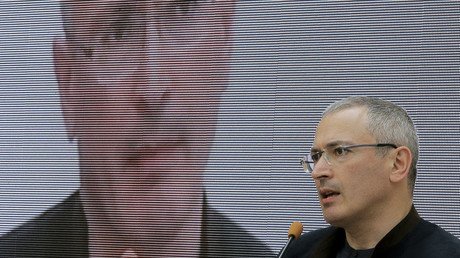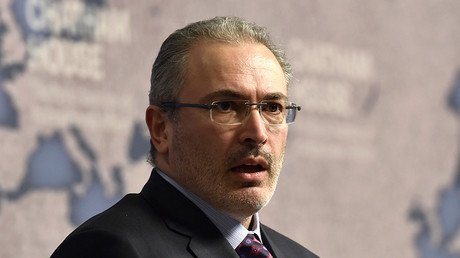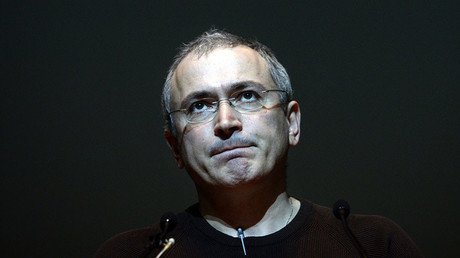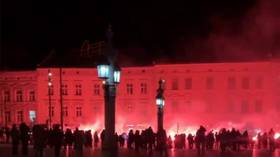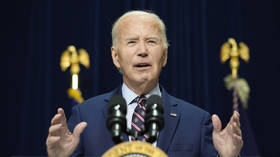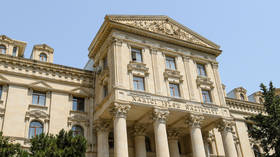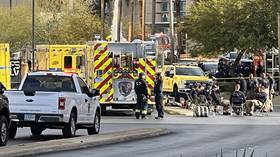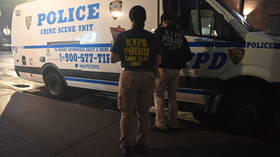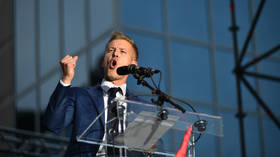Irish court names Khodorkovsky potential suspect in €100mn fraud
Former Russian oligarch Mikhail Khodorkovsky is a potential suspect in an ongoing money-laundering investigation over €100 million, frozen in Irish-domiciled funds for over five years, the Irish Times reports citing the Dublin District Court.
The investigation is being conducted by the Garda Bureau of Fraud Investigation (GBFI), a specialized division of Ireland's national police force, the Garda Síochána, which investigates “fraud-related crime involving complex issues of criminal law or procedure.”
The district court is being asked to unfreeze over €100 million (US$106 million) under the Criminal Justice (Money Laundering and Terrorist Financing) Act 2010, the newspaper reports.
The Irish-domiciled funds, which are in trusts, have been frozen since March 2011. The Irish state has renewed its freezing of the assets every 28 days for the past five-and-a-half years.
The case was reopened by Khodorkovsky himself, who claims that he has already answered all of the Garda’s questions concerning the source of money.
Khodorkovsy said he “perfectly understands” the action the Irish authorities took back in 2011 and doesn’t object to the freeze.
“At that time, I was still in prison and, naturally, I wasn’t able to provide the necessary explanations to the authorities. I think generally that fighting money laundering is the right thing to do and now we are advocating for close attention to be paid to money coming out of Russia,” he said, according to the Irish Times.
The Russian ex-oil magnate now believes it’s time his assets were unfrozen, or at least he expects the Irish court to explain what he has done wrong.
Speaking in court on Wednesday, Judge Timothy Lucey criticized the length of time the assets have been frozen, saying the procedure should be speedy. "[It’s] just as well it wasn't a two-year old race horse – it would be dog meat by now," he quipped.
Michael McDowell senior counsel for the state, said Khodorkovsky was the owner of the funds and that a court “in a country with which Ireland does business” had found him guilty of fraud and tax evasion. The money could have gone from Yukos, which was once worth $40 billion, into a “labyrinthine series” of trusts linked to particular individuals, he said, according to the Irish Times.
Remy Farrell, senior counsel for Khodorkovsky, told the court that "An Garda Siochana [Ireland’s police force] have acted as the instrument of a universally-discredited Russian regime."
Khodorkovsky’s counsel argued that Irish police were using a conviction that is internationally considered politically motivated for freezing the funds. He said there is no basis for criminal activity in relation to the money and the only evidence of criminal conduct is the Russian conviction.
“As time goes on it’s become increasingly difficult to justify the interference of the [Irish] state ... you have overwhelming evidence before you that the conviction [in Russia] was secured on the basis of Khodorkovsky’s political beliefs,” Farrell said.
Responding to Farrell’s comments, the Irish state’s legal counsel said: “The Gardai do not have to come to a concluded view that these [funds] are the proceeds of crime, all they have to do is come to the view that they have reasonable grounds to suspect it is.”
McDowell also read parts of a sworn affidavit by a garda involved in the case who said there are reasonable grounds to suspect money laundering, and that an investigation was ongoing into Khodorkovsky, his business partner Platon Lebedev and the corporate entities associated with them.
The burden of proof in the case lies with the Irish state which must provide evidence of Khodorkovsky’s financial wrongdoing. Any assertions can then be refuted by the defendant in court.
“Ireland is trying to crack down on money laundering in general – just earlier this month Ulster Bank was fined €3.3 million for failing to enforce its directives to take money-laundering training,” Irish financial journalist Nick Webb told RT.com.
Webb added that the likely reason the case has taken so long in the Irish courts is because under-resourced financial investigators have been focused on domestic banking cases, and the Russian case was likely “at the back of the pile”.
Damien Barnaville, partner at Irish financial services firm LK Shields, said Ireland follows anti-laundering directives from the EU and agreed that Ireland (as well as the US and UK) has recently “ramped up” their fines for, and prosecutions of, money-laundering.
Once Russia’s richest person, Yukos founder Khodorkovsky was arrested in October 2003. Following a lengthy trial, in 2005 he was convicted of tax evasion and sentenced to nine years in prison. Khodorkovsky was declared bankrupt by a Moscow court in 2006; Yukos was then nationalized with most of its assets eventually handed to oil giant Rosneft.
In 2009, Khodorkovsky was charged with embezzlement and money laundering. The second trial ended in late 2010 with a sentence of 14 years in prison, minus the term that he had already served. After another legal battle, the final ruling cut the sentence to 11 years.
In December 2013, Khodorkovsky was pardoned by President Vladimir Putin and left Russia for Germany to visit his elderly mother. Later he moved to Switzerland, which is now his main place of residence.
Earlier this year, the Russian Prosecutor General’s Office sent documents to Interpol that could see Khodorkovsky put on an international wanted list over charges of complicity in the 1998 murder of a Siberian city mayor.
The Russian branch of Interpol declared Khodorkovsky ‘wanted’ in February after local law enforcement reopened the case into the killing of Vladimir Petukhov, the mayor of Neftyugansk, who came into conflict with Yukos stakeholders and managers and was killed on June 26, 1998, Khodorkovsky’s 35th birthday.
